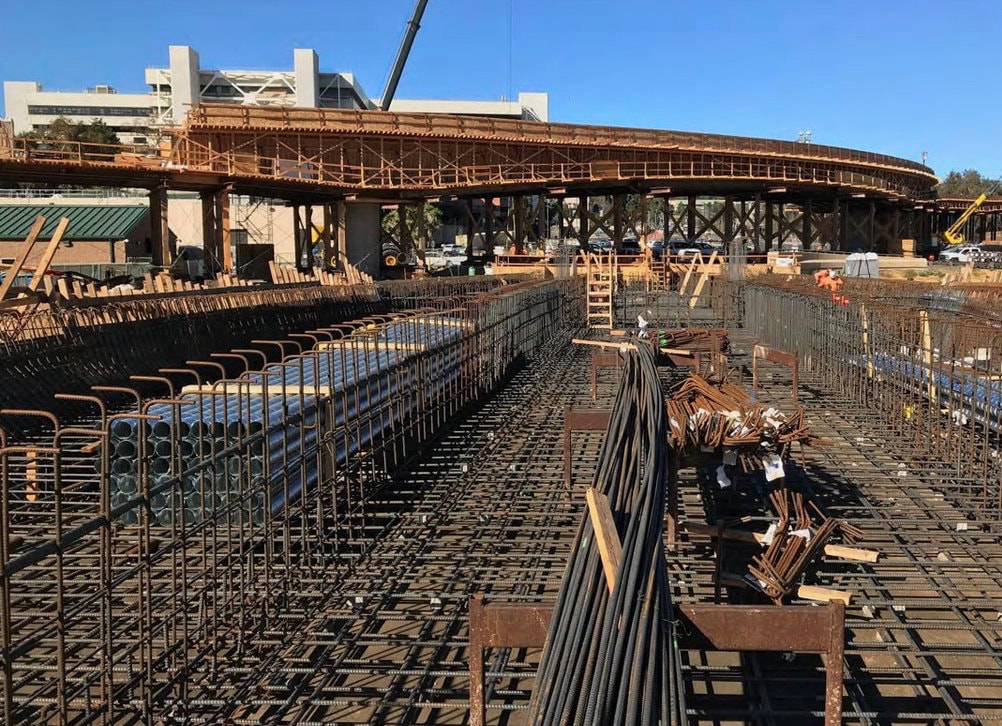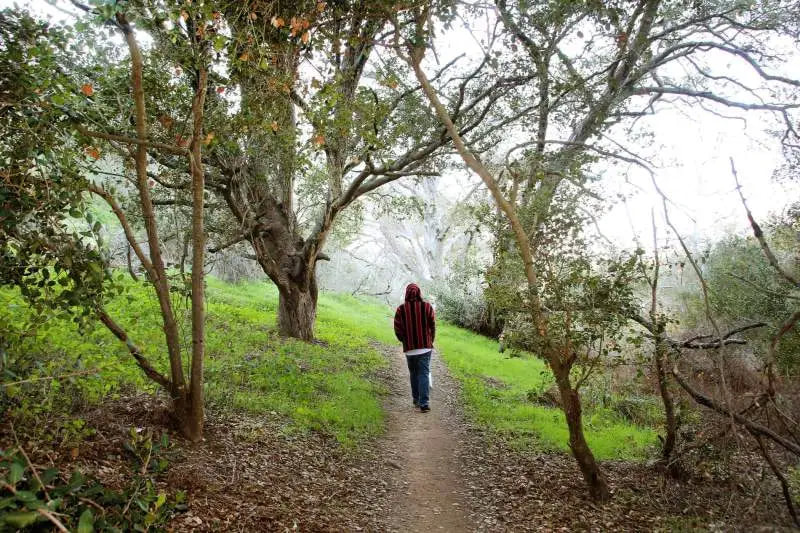|
By Karin E. Zirk, Ph.D. The problem has never been nature, but humans. In 1979, Audre Lorde wrote, "The master's tools will never dismantle the master's house. They may allow us temporarily to beat him at his own game, but they will never enable us to bring about genuine change." While she wrote this in response to racism, civil rights, and homophobia, I believe her essay of the same name applies to the climate crisis as well. As cities across the U.S. seek to build public infrastructure to reduce greenhouse gas emissions, are we using the master's tools? Concrete and the manufacturing of materials like steel and rubber all follow energy intensive consumption patterns, or as some might say, "embedded energy." In 2017, then-Governor Jerry Brown signed into law the Buy Clean California Act, which requires the state to identify lifetime energy consumption on certain construction materials it purchases for use. While this can be one part of the solution, a better solution is to stop converting land to concrete in the first place. As we consider otherwise meritorious projects, from transit to bike paths, we must make it a priority to keep them within the footprint of our already-paved environment, instead of locating them in unbuilt environments. After all, our open space, creeks, and even organic farms are the best resources we have to absorb carbon dioxide and reduce global warming. A regrettable example of this problem is the Mid-Coast Trolley extension, now under construction in what is called a railroad right-of-way (ROW). Under the Pacific Railroad Act of 1862, the U.S. government gave away lands (which had often been inhabited by indigenous people for eons), to private corporations for the purpose of building railroads and other money-making enterprises. Keep in mind that in the late 19th and early 20th centuries, railroad tracks and the amount of traffic they created were not impediments to the movement of people or wildlife. But I doubt any sane surveyor, then or now, would determine the best place to put a railroad ROW is on top of a creek, but in the case of the Mid-Coast Trolley, that's what's occurring. You can see it for yourself on the Rose Creek overpass ramp from westbound State Route 52 to either northbound or southbound I-5, or at points along the east side of Santa Fe Street, like behind the Karl Strauss Brewing location in Rose Canyon. Despite numerous attempts by activists to shift the alignment of the trolley line out of Rose Creek, the western edge of Marian Bear Natural Park, and portions adjacent to Rose Canyon Open Space Park, the trolley is going up on top of a creek that drains the 23,427 acre Rose Creek Watershed, and negatively impacts not only water quality in Rose Creek and Mission Bay, but the removal of oak trees hundreds of years old from the western edge of Marian Bear, forever removing the aesthetic beauty, habitat, and carbon sequesteration provided by those trees as green infrastructure. As noted in the CEQA and NEPA documents for the project, grease and brake dust will fall off the trolley and into the creek, increasing pollution levels in Rose Creek, and ultimately, in Mission Bay. The project has also removed portions of the historic floodplain for Rose Creek, with all of the relevant mitigation being done outside the watershed. The human and natural wildlife communities in portions of the Rose Creek Watershed are being degraded, right before our eyes. It's a bad habit San Diego has long embraced. The project is also having a negative impact on non-motorized travel by creating an impassible barrier for pedestrians and bicyclists from the Rose Canyon and Santa Fe Street bicycle paths to Marian Bear Park and Morena Boulevard by restricting east-west travel. Enjoyment of bicycling the Rose Canyon Bicycle Path is also being degraded. Originally it was between a freeway and an open space area with trees and rolling hills where one expected to see cattle grazing. Now it's a narrow, fenced-off path between a freeway and a busy railroad corridor. Between the pollution coming off the freeway and enhanced usage of the railroad ROW, bicyclists will now be hit from both sides. Some progress. Destruction of legal and illegal pathways for bicyclists and pedestrians, removal of trees, increased pollution of Rose Creek. All of this pollution to reduce C02 emissions? Something is wrong here. How is the Mid-Coast Trolley extension helpful to reaching our Climate Action Plan goals if it discourages residents and neighbors from riding their bicycles? How is it helpful if the wildlife that depend on Rose Creek for survival must drink polluted water, and can't move between the upstream open space canyons to the planned restored marshland at the mouth of Rose Creek in Mission Bay? We've had a marvelous canyon-to-coast widlife corridor for decades. Now we're cutting it off. How selfish and short-sighted. Furthermore, how is the Mid-Coast Trolley extension helpful if it further divides the communities of Clairemont and Pacific Beach? These dissections compound the worst tendencies of urban planning, and the same lack of care and attention that saw once-flourishing neighborhoods sliced in half, and in many cases, institutional racism aggravated in cities across the country with the freeway building boom of the mid-20th century. At the time, those concerns were dismissed as the price of "progress." We all agree providing fast and cleaner transportation is important, but doing so at the expense of everything else is not the answer. While I realize it's cheaper to "pave over paradise and put in a parking lot," continuing to engage in the same behavior that aggravates the climate crisis is not the right way to move forward, as Audre Lorde so insightfully pointed out over 40 years ago in Sister Outsider. Reducing C02 emissions is a laudable goal, but we must consider the entire system, including other types of air pollutants, water quality, habitat and the needs of wildlife, and the very real human need to connect with nature locally. Without holistic thinking and new "tools," we're not solving the problems we have created for this planet. We're just re-creating a planet with different problems. Karin Zirk is an author, the executive director of Friends of Rose Creek, and a member of San Diego County Democrats for Environmental Action. Blue line extension photo courtesy of the Mid-Coast Trolley Project / SANDAG
Marian Bear Memorial Park photo courtesy of Jessica Johnson / Hidden San Diego
1 Comment
By Cody Petterson with Tommy Hough
First and foremost, we hope all of you are healthy and safe during this unusual moment in history. Our club members are family, and we think of you and miss you at our monthly gatherings. As Earth Day 2020 nears, our thoughts turn to the health of our planet, to the multitudes of life with which we share our home, and to the work we have done and have yet to do to protect and preserve it. To be frank, the year has been difficult, the moment in which we find ourselves is challenging, and the vista ahead is troubling. Environmentalists must wrest partial, provisional victories from the vast, implacable, merciless destructiveness of human civilization. This work requires both a recognition of the global calamity unfolding around us, and a determination to save what we can, in spite of the longness of the odds. The coronavirus pandemic has made our work much more difficult. We are, above all, organizers, and organizing is quintessentially a social activity. Environmentalists around the world are innovating new ways to connect and motivate people, but the inability to gather is an inherent impediment to accumulating the social capital we need to build and maintain a movement. Furthermore, the pandemic has understandably drawn the attention of citizens, media, and elected officials away from our climate emergency and ecological collapse. This relative inattentiveness will likely be a headwind for environmental organizing for the duration of the pandemic. Even worse, with the attention of the public drawn to COVID-19, the Trump Administration and its allies in extractive industries like petroleum, mining, and timber have intensified their assault on our open spaces, special places, and National Parks. Globally, institutions like the European Central Bank and International Monetary Fund, which had begun a process to map out and chart ambitious agendas for greenhouse gas emissions reduction, have shifted their focus almost exclusively to staving off a COVID-related global depression. At the local level, sprawl developers are rushing to weaken our climate action plans and sneak through project amendments while the public is focused on the immediate health and survival of their families. While the dramatic reduction in greenhouse gas emissions and industrial and transportation-related pollutants has given our planet a brief respite – and all but killed the U.S. fracking and shale gas industries – it has also driven oil prices to the lowest levels in decades and reduced the relative attractiveness of alternative energy investment and development. We at San Diego County Democrats for Environmental Action are committed to working with our diverse set of allies in the environmental movement to innovate new ways of keeping our members informed, organizing our communities, resisting the efforts of anti-environmental interests to exploit the virus to further degrade our climate and ecosystems, and preparing the movement to radically transform our societies and governments in the wake of the pandemic. Of all the holidays, Earth Day may be the hardest to celebrate alone. It is a particularly cruel twist of history that the 50th anniversary arrives at this moment, when the U.S . environmental movement has been pushed to its lowest ebb since the end of World War II – the result of the Trump administration's daily desecrations, GOP intransigence and long-simmering hostility toward conservation, and the weak lip service many Democrats pay toward meaningful environmental progress. Elections truly have consequences. Earth Day is a celebration of the oneness of all life and our mutual interdependence and responsibility. It is also a repudiation of the social isolation that leaves each lifeform to fend for itself in the midst of global ecological collapse. In some ways, little has changed in our pursuit of a more livable planet and meaningful environmental justice since the first Earth Day 50 years ago this month, as detailed in the 1970 ABC News story linked below. But be assured, we will not be silent, and we will not cede the progress of the last three generations to the ugly, modern spasms of ignorance and greed that Trump personifies. Environmentalists have never had easy fights. The campaigns to preserve the Redwoods, the Mojave Desert, Stanislaus River, and National Parks like Grand Canyon, Pinnacles, or Joshua Tree took decades. We must now fight to retain what has been preserved, and at the same time move forward with building greater coalitions to end the use of fossil fuels, protect our climate and oceans, preserve habitat and open space, ensure real environmental equity, and embrace more livable and sustainable cities and communities. Our club is exploring on-line opportunities for programming to virtually reaffirm our connections, and the fundamentally social nature of our work. We'll have more details on how this will occur, even as our regular, in-person meetings and gatherings remain on hold for the time being. In the meantime, please don't hesitate to reach out to us or our club's executive board if you need assistance. Ours is a community and a family. We're here to support one another in good times and bad. And take a moment to appreicate the far-reaching views and cleaner-than-normal air this spring. If the coronavirus pandemic has shown us anything, it's that demonstrable, rapid change in habit, behavior, and society are indeed possible. |
Green Thoughts
The blog component of San Diego County Democrats for Environmental Action welcomes content from SDCDEA members, guests and leadership. Archives
October 2023
Categories |
Social Media
Quick Links |



 RSS Feed
RSS Feed

